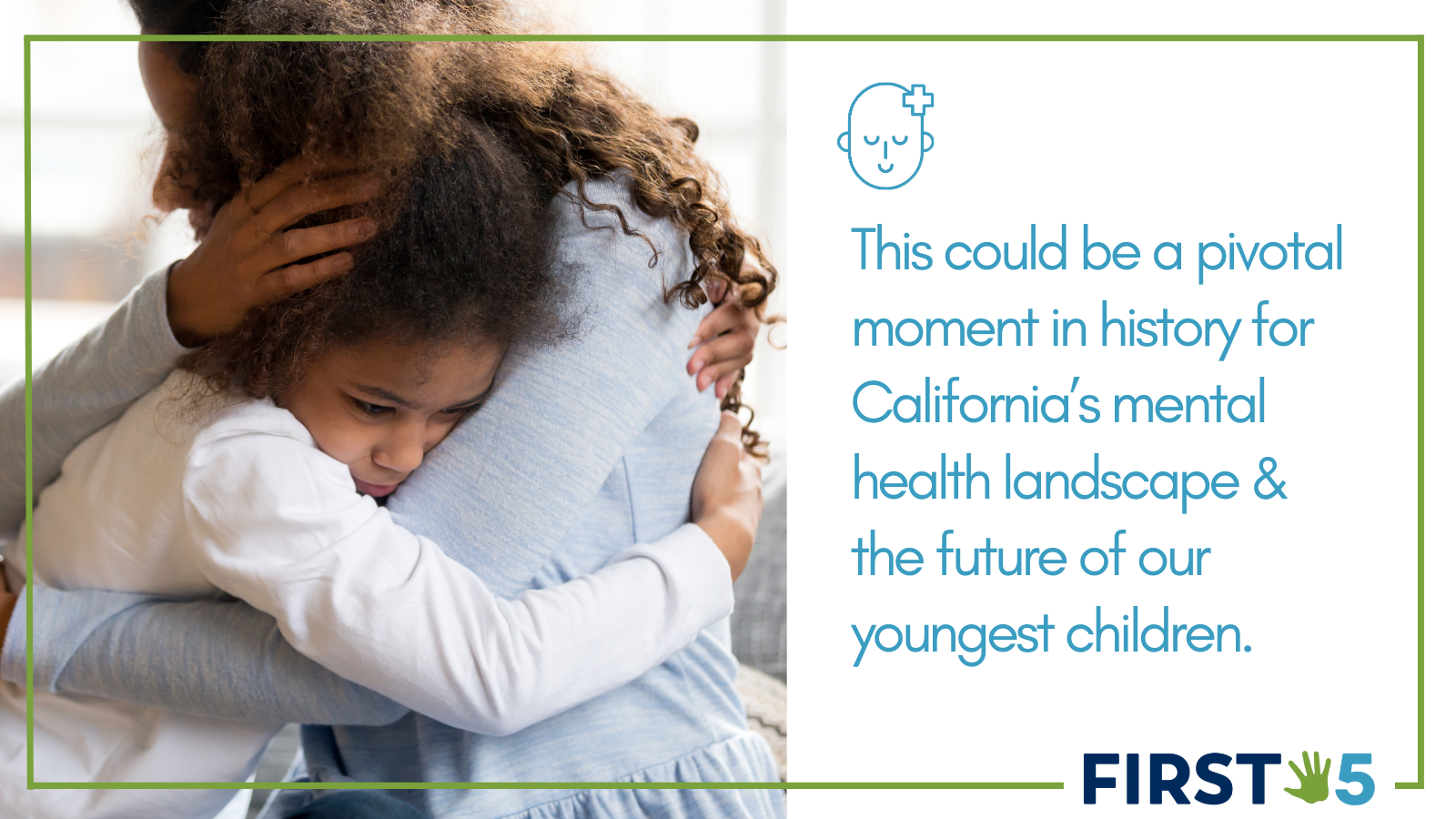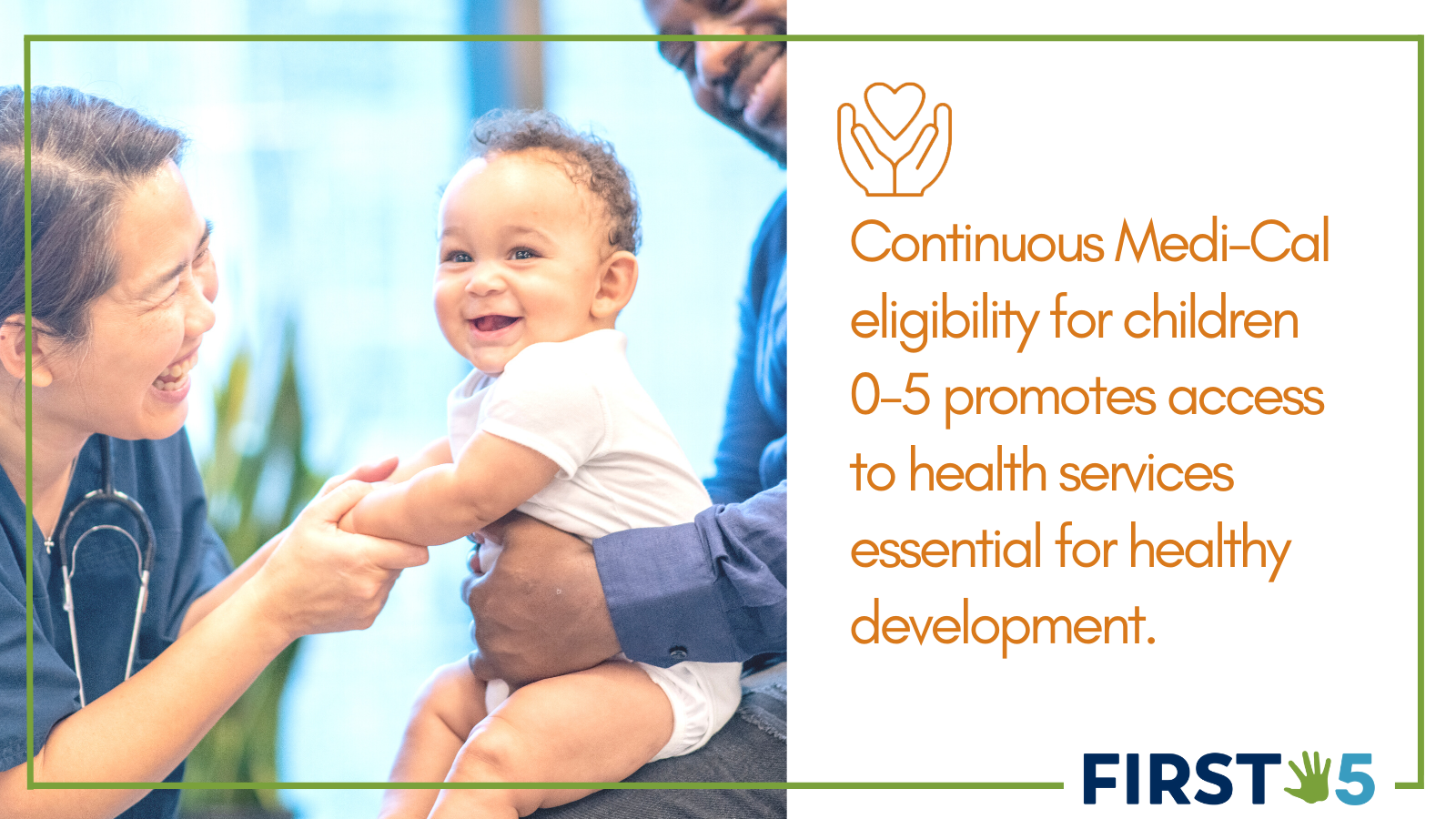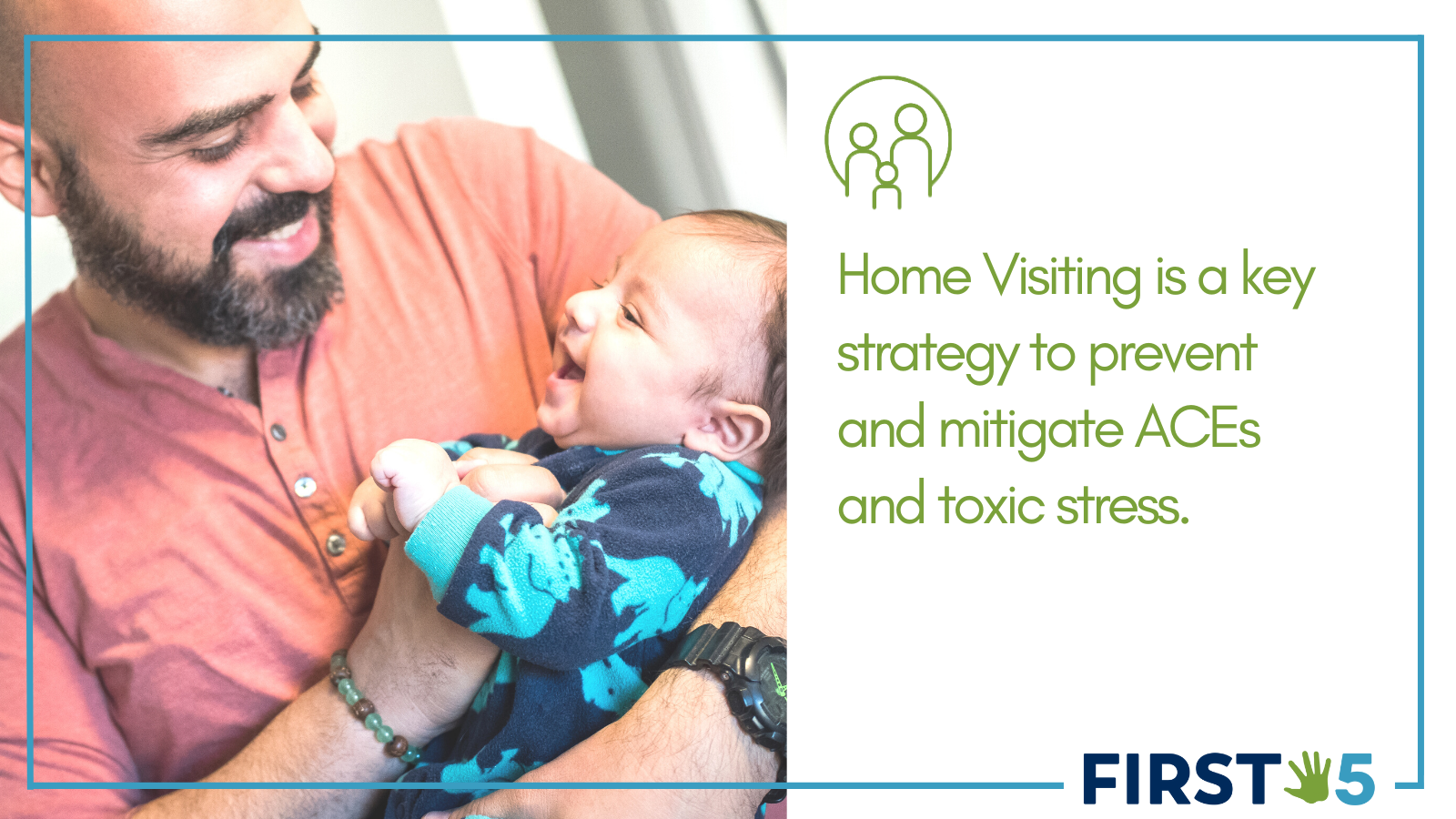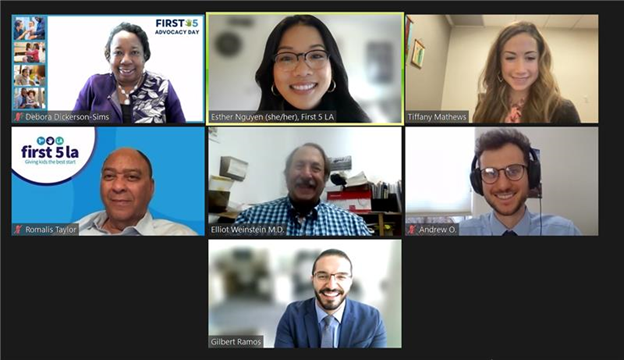April 28, 2022 | 8 Minute Read
Illustrating the power of the collective voice, First 5 LA joined the statewide network of First 5s on April 19 for the annual Advocacy Day event to urge California lawmakers to prioritize early childhood in budget and policymaking and maintain gains in family-serving systems made during the COVID-19 pandemic.
During the event, the First 5 LA delegation participated in more than two dozen scheduled virtual meetings with state lawmakers and their staff representing Los Angeles County. The annual convening, sponsored by the First 5 Association of California, is the premier advocacy event of the year for dozens of First 5s, leading up to the state’s 2022-23 fiscal year beginning July 1 and legislative deadlines in the fall.

“This year‘s Advocacy Day was a terrific opportunity to connect with nearly every single member of L.A. County’s legislative delegation and advocate for the importance of the early years in a child’s life, the imperative to prioritize young children in policymaking, and specific policy changes, grounded in First 5 LA‘s efforts to change child- and family-serving systems to work for children and families,” said First 5 LA Executive Director Kim Belshé.
“Now two years into the pandemic, we are really thinking deeply about our priorities and about how COVID-19 has not only highlighted the existing disparities within our child and family-serving systems but exacerbated them.” – First 5 LA Chief Government Affairs Officer Charna Widby
Alongside its partners in the Early Care and Education Coalition and the First 5 Association (which represents all 58 First 5 county commissions statewide), First 5 LA advocated for budget and legislative priorities related to family supports, family health and early learning, including those proposed in Governor Newsom’s 2022-23 budget.
Given the ongoing nature of the pandemic, First 5 LA and its partners also spoke to the importance of policies that can help address the pre-existing inequities illuminated by the coronavirus.
Charna Widby, chief government affairs officer for First 5 LA’s Office of Government Affairs and Public Policy, which led the First 5 LA delegation, said: “Now two years into the pandemic, we are really thinking deeply about our priorities and about how COVID-19 has not only highlighted the existing disparities within our child and family-serving systems but exacerbated them.”
“The pandemic has shown we can do better, and we need to do better. We’ve seen systems adopt a lot of flexibilities since the crisis began, but many are temporary. We should maintain those to give more choice to communities and families rather than adhere to a one-size-fits-all approach.” – First 5 LA Senior Policy Analyst Andrew Olenick
To this end, First 5s advocated for policies and investments that prioritize prevention and intervention services and lower barriers to accessing essential physical and mental health services and systems of care to meet families where they are.
During the pandemic, some systems adjusted to increase access for families with young children, including Medi-Cal (which provided continuous coverage to children) and home visiting (which instituted virtual visits).
“The pandemic has shown we can do better, and we need to do better,” said Andrew Olenick, a senior policy analyst with First 5 LA’s Office of Government Affairs and Public Policy. “We’ve seen systems adopt a lot of flexibilities since the crisis began, but many are temporary. We should maintain those to give more choice to communities and families rather than adhere to a one-size-fits-all approach.”

WHO WE ARE, WHAT WE ADVOCATED FOR — AND THE COVID-19 CONNECTION
The First 5 LA delegation included Widby, Olenick, Executive Director Kim Belshé, Commissioner Romalis Taylor, Commissioner Carol Sigala, Commissioner Robert Byrd, Senior Government Affairs Strategist Jamie Zamora, Government Affairs Strategist Anais Duran, Senior Policy Strategist Ofelia Medina, Policy Analyst Esther Nguyen and Local Policy Specialist John Bamberg. Joining the delegation were representatives of First 5 LA’s Sacramento advocate, California Strategies, which included Partner John Benton, Partner Monique Ramos, Associate Tiffany Mathews and Associate Lily MacKay.
A detailed list of First 5 LA’s budget and legislative priorities highlighted during Advocacy Day meetings with lawmakers — and the reasons First 5 LA supports them — can be found at the new First 5 Advocacy Day 2022 summary page, available here.
Below is a summary of these priorities.
ECE Coalition’s 2022-2023 State Budget Priorities for early learning supports. To stop a widening wealth gap between women and men, particularly women of color, and continue economic growth, First 5 LA joined the ECE Coalition in asking for $1.3 billion in federal and state investments to increase child care provider wages; $187 million to waive family fees through September 2024; $310 million in investments in child care infrastructure and $250 million in workforce development grants.
The availability of child care significantly impacts the ability of women to return to work. While men have returned to work, more than 1.8 million women have not returned since February 2020. And it’s worse for women of color. At the same time, the child care industry is still down 131,000 jobs since February 2020 due to financial struggles and closures of child care centers. Low wages are one of the main reasons providers, predominantly Black and Latinx women, are leaving the child care field and not entering, or reentering, the profession.
ECE Coalition 2022 priorities are available here.
SB 976 (Leyva), which would establish universal preschool to provide California’s young children and their families equitable access to quality early learning and care services. SB 976 would help maintain family choice and create a true mixed-delivery system by allowing community-based programs to offer universal preschool for all 3- and 4-year-olds.
Ensuring young children and their families have ample choices in early learning services is especially critical in today’s economy, given the continued impact of the COVID-19 pandemic on working-class, low-income, and communities of color.
AB 92 (Reyes), which would establish a more equitable sliding scale for family fees utilizing state-subsidized preschool and child care services. AB 92 would help ensure that low-income and working families have access to affordable early learning services and supports by capping fees for state-subsidized preschool and child care to no more than 1 percent of a family’s monthly income and waiving them altogether for those earning less than 75 percent of state median income and receiving cash aid through CalWORKs through October 31, 2023.
Many families utilizing subsidized care are required to pay a family fee. The family fee is based on a family’s size, adjusted monthly income, and type of care needed (full- or part-time). Most families with child care subsidies are Black and Latinx. Parents, particularly mothers of color, have dropped out of the workforce or reduced their work hours because they cannot afford family fees during the pandemic.
SB 951 (Durazo), which would phase in higher levels of wage replacement through California’s Paid Family Leave program and, by 2025, provide many new parents with 90 percent of their wages when they take eight weeks of leave to care for their child. This would improve outcomes in child development, maternal physical and mental health and economic security for families, as well as retention and productivity for businesses. Currently, the state’s Paid Family Leave program replaces just 60 to 70 percent of an individual’s wages when they take leave to care for a new child. Absent state action this year, that will drop even lower, to 55 percent of an individual’s wages.

AB 2402 (Blanca Rubio, Wood), which would require that children under age 5 receive continuous eligibility for Medi-Cal. Overall, this bill would ensure no children under age 5 served by Medi-Cal lose access to health care coverage through that program due to temporary changes in family income. Continuous Medi-Cal coverage is essential for avoiding disruptions in care. This is especially crucial during the first five years of life when medical visits occur frequently, and the brain is developing more rapidly than at any other time in life.
During the COVID-19 public health emergency, children under age 5 temporarily received continuous coverage through Medi-Cal, remaining on the program regardless of changes to family income during the course of a year. However, without legislative action, children could begin losing Medi-Cal coverage once the emergency ends. AB 2402 represents an opportunity for California to continue doing something it’s done well during the COVID-19 pandemic: ensuring young children have continuous access to vital health care coverage.

Funding in the governor’s January budget for $50 million to expand the California Home Visiting and Black Infant Health programs and to ensure flexibility in the state’s home visiting models. Home visitors have served as a critical link of support for families throughout the COVID-19 pandemic, especially those facing a variety of challenges that have been exacerbated by this crisis. Families should have a choice regarding where and how they receive home visits — whether it be in the home, at a community setting or clinic, or via telehealth — as this is critical to meeting families where they are and where they feel safe. Strengthening the Black Infant Health program and ensuring families can continue to participate virtually, as they have during the COVID crisis, will support Black maternal health and help reduce the unacceptably high rate of maternal mortality among Black mothers in California.
Funding for $250 million to be dedicated to Infant and Early Childhood Mental Health Services for children prenatal to age 5. This would support evidence-based, evidence-informed and community-defined best practices and strategies to improve the social-emotional health of young children. It would also provide for additional workforce development and the hiring and training of qualified early childhood mental health consultants.
ELECTED OFFICIALS CHEERING ON FIRST 5s
In their virtual meetings, the First 5 LA delegation reported positive engagement with lawmakers and their staff. Many have worked with First 5s before on legislation and state investments to improve the lives of young children and their families.

“The reason I think they were engaged is that we have met with them in the past,” said First 5 LA Commissioner Romalis Taylor, who met this time with the offices of Assemblymember Freddie Rodriguez (D-Pomona), Assemblymember Reginald Byron Jones-Sawyer, Sr. (D-Los Angeles) and State Senate Republican Leader Scott Wilk (R-Santa Clarita). “This showed me how important it is to continue to engage these legislators. That tells me that we’re having an impact.”
Belshé praised the teamwork behind First 5 LA’s Advocacy Day efforts, noting: “Our Office of Government Affairs in Public Policy did an extraordinary job, engaging and supporting the inclusion of First 5 LA commissioners in these briefings, coordinating dozens of meetings with members and staff, and collaborating with First 5 commissions across the state.”
Mirroring this message of teamwork, State Senator Connie M. Leyva (D-Chino) gave a rousing virtual speech during the Advocacy Day event that reflected how state lawmakers value the work of First 5s.
“Please note that there are so many other elected officials like me who are cheering you on,” she told the First 5s. “Keep up the great work. When we work together, we win together.”
Editor’s Note: The Virtual Advocacy Day event occurs over two weeks and will officially end with the Dia de los Libros virtual bilingual storytelling event on Friday, April 29, 2022, at 10 a.m. The hourlong event, held on Facebook Live, will feature Jennifer Siebel Newsom, First Partner of California, and other notable Californians for a celebration of culture and connection through story in honor of El Día de los Niños and El Día de los Libros. Click the Facebook Live link to register.









